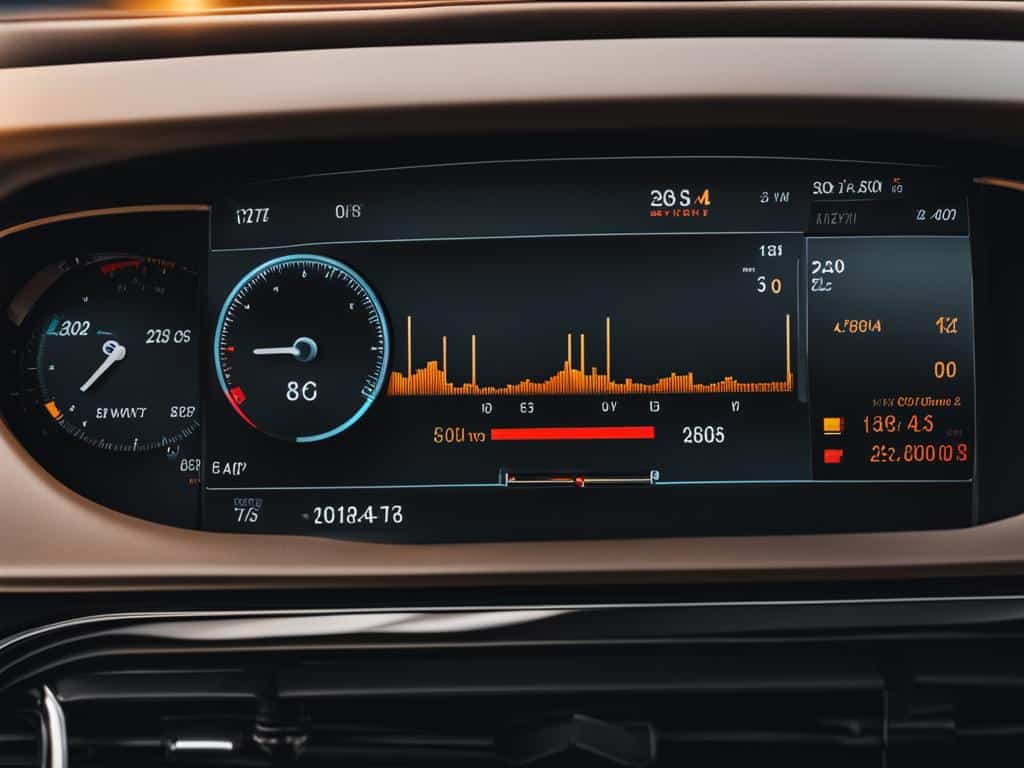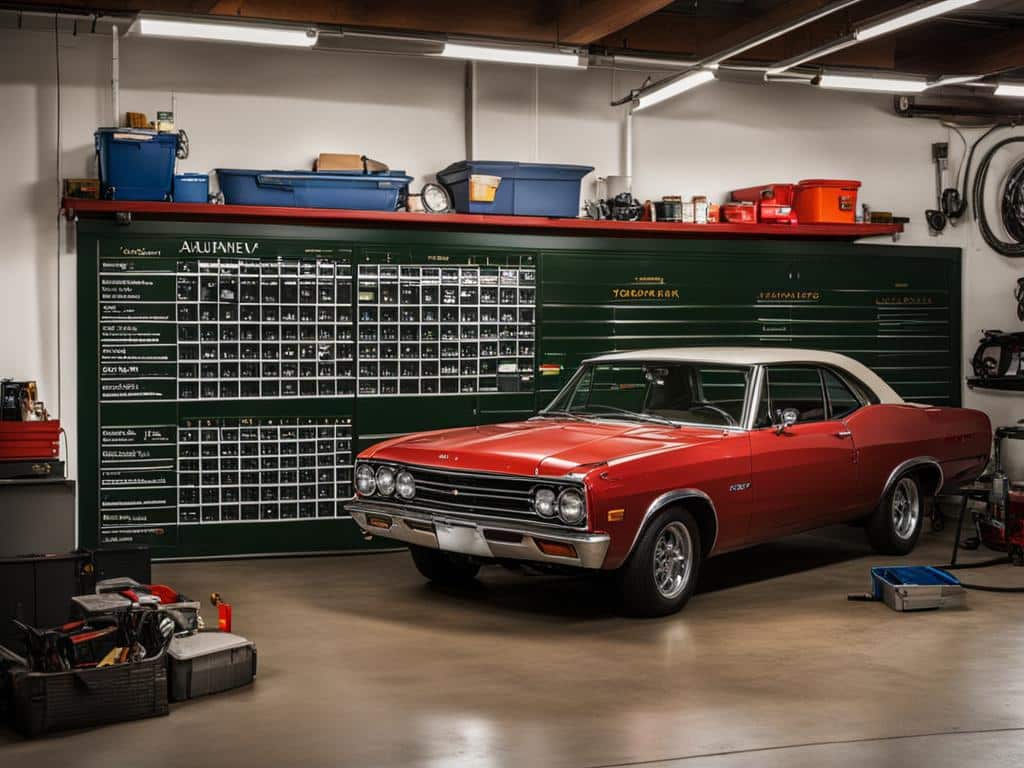As a car owner in New Zealand, it’s important to understand how frequently you should service your vehicle. Regular car servicing is vital for maintaining its performance, ensuring your safety on the road, and preventing costly repairs in the long run.
So, how often do you need to service your car in NZ? Well, the general rule is to have your car serviced once per year. However, this can vary depending on a few factors such as the age of your car, the type of fuel it uses, and your driving habits. Let’s dive into the details.
Key Takeaways:
- Most cars in NZ should be serviced annually.
- Older cars may require more frequent servicing.
- Components like engine oil, brake fluid, and transmission fluid need regular checks and replacements.
- Air conditioning should be checked every two years.
- Regular maintenance and prompt attention to car problems help keep your vehicle in good condition.
Importance of Regular Car Servicing
Regular car servicing is crucial for several reasons. First, it helps ensure the safety of both you and other road users by identifying and addressing any potential issues early on. It can also save you money in the long run by preventing more serious and costly repairs. Regular servicing keeps your vehicle running efficiently, improving fuel economy and reducing the risk of major mechanical failures. It also makes it easier to pass warrant of fitness (WOF) checks, as well as helps your car hold its value for longer.
The frequency of servicing depends on various factors such as the condition, age, and driving history of your vehicle. Newer cars generally require servicing once a year, while older cars may need more frequent servicing. It is always best to consult your owner’s manual or seek advice from a trusted mechanic to determine the ideal service interval for your specific vehicle.
By staying proactive and adhering to regular car servicing, you can ensure the safety, reliability, and longevity of your vehicle. Don’t neglect this vital aspect of car maintenance, as it can have a significant impact on your driving experience and overall peace of mind.
Table: Benefits of Regular Car Servicing
| Benefit | Description |
|---|---|
| Safety | Identifying and addressing potential issues early on |
| Cost savings | Preventing more serious and costly repairs |
| Fuel economy | Improving overall efficiency and reducing fuel consumption |
| Passing WOF checks | Maintaining compliance with mandatory safety inspections |
| Vehicle value retention | Preserving the value of your car over time |
Consequences of Neglecting Car Service
When it comes to car maintenance, neglecting regular service can have serious consequences for both your vehicle and your wallet. Ignoring the recommended service intervals can lead to a number of problems that could have been easily prevented. Let’s take a closer look at some of the consequences of neglecting car service in New Zealand.
Reduced Fuel Economy
One of the immediate effects of neglecting car service is reduced fuel economy. Over time, dirty filters, worn spark plugs, and other neglected maintenance issues can cause your car’s engine to work harder, consuming more fuel than necessary. This not only increases your fuel costs but also harms the environment by emitting more pollutants.
Increased Risk of Mechanical Failures
Regular servicing helps identify and address potential issues before they become major mechanical failures. Ignoring routine maintenance can result in problems such as engine overheating, brake failure, transmission issues, and more. These types of failures can be not only inconvenient but also extremely costly to repair.
Compromised Safety
Skipping car service appointments can compromise the safety of your vehicle and everyone on the road. Worn-out brake pads, low tire tread, faulty lights, and other neglected maintenance can all contribute to unsafe driving conditions. Regular servicing ensures that your vehicle is in optimal condition, reducing the risk of accidents caused by mechanical failures.
Accelerated Wear and Tear
Neglecting routine maintenance can lead to accelerated wear and tear on various components of your car. Failing to change engine oil regularly, for example, can cause increased friction and damage to engine parts. Over time, this can result in more frequent breakdowns and the need for costly repairs.
The Cost of Neglect
While it may be tempting to skip a car service to save some money in the short term, the long-term costs of neglecting maintenance far outweigh the initial savings. Regular servicing helps identify and address minor issues before they turn into major problems, preventing expensive repairs down the line.
Remember, regular car servicing is essential for maintaining the safety, reliability, and longevity of your vehicle. Don’t overlook the importance of routine maintenance – it’s an investment that pays off in the long run.
Signs Your Car Needs Servicing
Regular car servicing is crucial to maintain the performance and safety of your vehicle. However, it’s not always easy to determine when your car needs servicing. Fortunately, there are several signs you can look out for that indicate it’s time to book a service appointment.
One of the most common signs is unusual noises coming from your car. If you hear strange sounds when starting the engine or while driving, it could be a sign of underlying issues that need attention. Additionally, if your brakes feel unresponsive or you notice poor traction from your tires, it’s important to have your car checked by a professional mechanic.
Other indicators that your car needs servicing include high engine revs, excessive temperature gauge readings, smoke from the exhaust, and abnormal steering or pulling to one side. Paying attention to any of these signs and addressing them promptly can help prevent further damage and costly repairs in the future.
Table: Common Signs Your Car Needs Servicing
| Signs | Description |
|---|---|
| Unusual Noises | Noises when starting the engine or while driving |
| Unresponsive Brakes | Brakes feel soft or take longer to respond |
| Poor Traction | Tires have reduced grip or slip easily |
| High Engine Revs | Engine revs higher than usual when driving |
| Excessive Temperature Gauge Readings | Temperature gauge indicates unusually high temperatures |
| Smoke from the Exhaust | Visible smoke coming from the exhaust |
| Abnormal Steering or Pulling | Car pulls to one side or steering feels off |
If you notice any of these signs, it’s important not to ignore them. Continuing to drive your car without addressing developing issues can worsen the problem and lead to more expensive repairs down the line. When in doubt, it’s always best to consult a professional mechanic to have your car thoroughly inspected and serviced.

Service Recommendations for Newer Vehicles
For newer vehicles that are less than four years old, it is generally recommended to service your car once a year. This frequency is suitable for regular drivers who are not exceeding high mileage. Regular checks of key components such as tires, windscreen, engine, brakes, and electrics, along with fluid level inspections, help maintain safety on the road. If you drive more than 20,000 to 25,000 km per year, additional servicing may be required to ensure optimal performance and reliability. It is essential to follow the manufacturer’s recommendations and consult a reliable mechanic to determine the ideal service frequency for your newer vehicle.
Recommended Service Intervals for Newer Vehicles:
| Vehicle Age | Recommended Service Interval |
|---|---|
| Less than 1 year | Once a year |
| 1-2 years | Once a year |
| 2-3 years | Once a year |
| 3-4 years | Once a year |
Following the recommended service intervals for your newer vehicle helps ensure that it remains in optimal condition and continues to provide safe and reliable transportation. Regular servicing helps identify potential issues before they become major problems, saving you time, money, and the inconvenience of unexpected breakdowns. By adhering to the service recommendations, you can maximize the lifespan of your vehicle and maintain its value over time.
Service Recommendations for Older Vehicles
When it comes to older vehicles, regular servicing becomes even more crucial to maintain their condition and reliability. The recommended service frequency for older cars varies depending on factors such as the vehicle’s condition, servicing history, and driving habits. As a general guideline, it is advisable to have a service appointment once a year for older vehicles that are not driven extensively or used for long road trips.
If you drive your older car daily or cover a high annual mileage, it is recommended to have more frequent servicing to address its specific needs. By having regular servicing, even for well-maintained older cars, you can ensure their optimal condition, safety, and longevity. Regular checks and maintenance of key components such as the engine, brakes, tires, and electrics are essential to identify and address any potential issues before they turn into major problems.
By following a regular service schedule, you can stay one step ahead of any potential issues and keep your older vehicle running smoothly. Not only will this help maintain its reliability and performance, but it will also contribute to your safety on the road. Remember, each older car has its own unique requirements, so it’s always best to consult a trusted mechanic for personalized advice on the ideal service intervals for your specific vehicle.
Benefits of Regular Car Servicing
Regular car servicing offers several significant benefits. First and foremost, it helps keep you and others safe on the road by identifying and addressing potential safety issues. By preventing major repairs, regular servicing can save you money in the long run. It also improves the overall efficiency of your vehicle, resulting in better fuel economy. Additionally, regular servicing makes it easier to pass warrant of fitness (WOF) checks, which are mandatory in New Zealand. By taking care of your car through regular servicing, you can help extend its lifespan, maintain its value, and enjoy a more reliable driving experience.
One of the notable advantages of regular car servicing is the ability to detect and address potential safety issues. During a service appointment, a skilled mechanic will inspect various components of your car, including brakes, tires, suspension, and lights, to ensure they are in optimal condition. Identifying and fixing any existing or potential safety concerns can help prevent accidents and protect both you and other road users. Regular servicing also includes checking and replacing important fluids such as engine oil, coolant, and brake fluid, which play a crucial role in maintaining the safe operation of your vehicle.
Another key benefit of regular car servicing is the potential for cost savings in the long run. By addressing minor issues or wear and tear during servicing appointments, you can prevent them from developing into more serious and expensive repairs down the line. For example, replacing a worn-out timing belt or a faulty alternator early on can prevent engine damage or electrical system failure, saving you from costly repairs or even engine replacement in the future.
Regular car servicing can save you money in the long run by preventing major repairs and addressing minor issues before they become costly problems.
Regular servicing also helps improve the overall efficiency of your vehicle, resulting in better fuel economy. During a service appointment, the mechanic will check and clean the air filter, inspect the fuel system, and ensure the engine is running optimally. These measures can improve fuel combustion and reduce fuel consumption, ultimately saving you money at the pump. Additionally, regular servicing helps keep your car’s engine and other systems in good working order, reducing the risk of major mechanical failures and the associated expenses.
Lastly, regular car servicing makes it easier to pass warrant of fitness (WOF) checks in New Zealand. WOF checks are required to ensure that vehicles on the road meet safety and environmental standards. By keeping up with regular servicing, you can address any potential issues or deficiencies before the WOF inspection, increasing the likelihood of a successful outcome. This is particularly important for older vehicles, as regular servicing helps ensure they remain roadworthy and compliant with the necessary regulations.
Overall, regular car servicing is vital for maintaining the safety, performance, and longevity of your vehicle. It offers numerous benefits, including improved safety, cost savings, better fuel economy, and compliance with regulatory requirements. By prioritizing regular servicing and consulting a trusted mechanic, you can help keep your car in optimal condition and enjoy peace of mind on the road.

Conclusion
Regular car servicing is crucial for maintaining the safety, performance, and longevity of your vehicle. In New Zealand, most cars require servicing once a year, but the frequency can vary based on factors like age, condition, and mileage. It is important to follow the manufacturer’s recommendations and consult a trusted mechanic to determine the ideal service intervals for your car.
By prioritizing regular servicing, you can avoid costly repairs, improve fuel efficiency, and ensure the safety of yourself and others on the road. Neglecting car maintenance can lead to reduced fuel economy, poor performance, and major mechanical failures. Adhering to recommended service intervals helps identify and address potential issues early on, preventing further damage and expensive repairs.
Remember, regular servicing not only saves you money in the long run but also makes it easier to pass warrant of fitness (WOF) checks. By taking care of your car through regular servicing, you extend its lifespan, maintain its value, and enjoy a more reliable driving experience. Don’t neglect your car’s maintenance needs – stay proactive in keeping your vehicle in optimal shape.
FAQ
How often do I need to service my car in New Zealand?
The general rule for most vehicle types in New Zealand is to service your car once per year. However, if you are a frequent driver, more regular servicing may be beneficial. The age of your car and the type of fuel it uses also impact the recommended servicing time period.
What are the consequences of neglecting car service?
Neglecting regular car servicing can result in reduced fuel economy, poor performance, major mechanical failures, and expensive repairs. It can also compromise safety, as components such as brakes can become less effective over time.
What are the signs that my car needs servicing?
Unusual noises, unresponsive brakes, poor traction, high engine revs, excessive temperature gauge readings, smoke from the exhaust, and abnormal steering or pulling to one side are all signs that your car requires attention.
How often should I service my newer vehicle?
For newer vehicles that are less than four years old, servicing once a year is generally recommended. If you drive more than 20,000 to 25,000 km per year, additional servicing may be required.
How often should I service my older vehicle?
Older vehicles, typically more than four years old, may require more frequent servicing. The recommended service frequency for older cars depends on factors such as the vehicle’s condition, servicing history, and the amount of driving done.
What are the benefits of regular car servicing?
Regular car servicing improves safety, saves money in the long run, enhances fuel economy, makes it easier to pass warrant of fitness checks, and helps extend the lifespan and value of your car.




